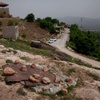Disclaimer
This entry contains information known to us from a variety of sources but may not include all the information currently available. Please be in touch if you notice any inadvertent mistakes in our presentation or have additional knowledge or sources to share. Thank you.
Archive
Cave at Bamarne, Iraqi-Kurdistan
Bamarne Cave: A cave in Bamarne, located approximately 15 miles from the Turkish border, once belonged to the Jews who lived there between 1940 and 1950, and served as a place for friends to gather at the end of every month for post-dinner discussions. The non-Jewish Kurdish people in Bamarne were curious about these meetings, but did not know the topics of discussions, just that discussions occurred. When asked, by the Kurdish elders, the local Jews are said to have claimed that a regular topic was how they could secure their rights in Iraq.
Description
Bamarne is approximately 15 miles (24km) from the Turkish border. Around Bamarne there are 29 villages and 1,715 families. [1]
Passover: Passover or Pesach (Heb. Pesah) is a major feast in Judaism. Jewish families living in isolated villages in Kurdistan would travel to bigger towns at this time to celebrate with other Jews. Citizens of Bamarne went to the town of Amadiya, along with the citizens from other villages near Amadiya, such as Inishk, ‘Aradan, Eqdish, Be’enatan, and Hamdhiye. They went to Amadiya three or four days before Passover and brought cattle and wine with them. [2] In both Bamarne and Amadiya, myrtle-wood sticks were used to draw diagonal lines across the matzot (matzah) to distinguish between the three different types of the unleavened bread. One line signified Kohen, two lines signified Levi, and three lines signified Yisrael. [3]
Turkish Influence: Outside of Bamarne there are two Turkish bases. One is a small base on a hill that is southwest of Bamarne. The other is larger and is on a road less than ½ km southeast of the town. The two bases control all traffic in and out of the town. They were established in 1996, during the civil war between the two main Kurdish parties, through an agreement with the Kurdistan Democratic Party. [4]
Sources
[1] Christian Peacemaker Teams (CPT), “Where there is a promise, there is a tragedy,” (2010), 21.
[2] Erich Brauer and Raphael Patai, The Jews of Kurdistan (Detroit: Wayne State University Press, 1993), 275.
[3] Ibid., 282
[4] CPT, “Where there is a promise, there is tragedy.”
[5] Diarna interview, May 1, 2012, Time 1:45-2:27.
![Cave at Bamarne, Cave [1], (Bamarne, Iraqi-Kurdistan, 2014)](https://cdn.filestackcontent.com/sqdgF8jVSgaXPtKvtC1y/convert?w=100&h=100&fit=crop)
![Cave at Bamarne, Cave [2], (Bamarne, Iraqi-Kurdistan, 2014)](https://cdn.filestackcontent.com/6UZO08mQKCqrgI203laR/convert?w=100&h=100&fit=crop)
![Cave at Bamarne, Cave [3], (Bamarne, Iraqi-Kurdistan, 2014)](https://cdn.filestackcontent.com/bj0bNzrYR0GoSRvrRxXm/convert?w=100&h=100&fit=crop)
![Cave at Bamarne, Cave [4], (Bamarne, Iraqi-Kurdistan, 2014)](https://cdn.filestackcontent.com/rvyDPL1wRAaHBX8o0BSa/convert?w=100&h=100&fit=crop)
![Cave at Bamarne, Cave [5], (Bamarne, Iraqi-Kurdistan, 2014)](https://cdn.filestackcontent.com/K1rAGYQ0QBiOqyYaCuVZ/convert?w=100&h=100&fit=crop)
![Cave at Bamarne, Cave [6], (Bamarne, Iraqi-Kurdistan, 2014)](https://cdn.filestackcontent.com/beyUgpxaRMiCVq47kqnw/convert?w=100&h=100&fit=crop)
![Cave at Bamarne, Cave [7], (Bamarne, Iraqi-Kurdistan, 2014)](https://cdn.filestackcontent.com/3yWAJ9HTnO62dTtFhqIA/convert?w=100&h=100&fit=crop)

![Cave at Bamarne, Cave Exterior [1], (Bamarne, Iraqi-Kurdistan, 2014)](https://cdn.filestackcontent.com/VUvkFTcyTkqB5hiYlHHh/convert?w=100&h=100&fit=crop)
![Cave at Bamarne, Cave Exterior [2], (Bamarne, Iraqi-Kurdistan, 2014)](https://cdn.filestackcontent.com/SzTxSG9PT56epHeXY8JT/convert?w=100&h=100&fit=crop)
![Cave at Bamarne, Man [1], (Bamarne, Iraqi-Kurdistan, 2014)](https://cdn.filestackcontent.com/DU4O6d9IQ0qjohqsHX1o/convert?w=100&h=100&fit=crop)
![Cave at Bamarne, Man [1], (Bamarne, Iraqi-Kurdistan, 2014)](https://cdn.filestackcontent.com/RjXnMz9R7azHQS5WJ6SG/convert?w=100&h=100&fit=crop)
![Cave at Bamarne, Man [3], (Bamarne, Iraqi-Kurdistan, 2014)](https://cdn.filestackcontent.com/bu7hlVR3QSKHce67QNSl/convert?w=100&h=100&fit=crop)

![Cave at Bamarne, House [1], (Bamarne, Iraqi-Kurdistan, 2014)](https://cdn.filestackcontent.com/dDJE8NREuQDAcht7G2Xg/convert?w=100&h=100&fit=crop)
![Cave at Bamarne, House [2], (Bamarne, Iraqi-Kurdistan, 2014)](https://cdn.filestackcontent.com/5rUnOyfSq2vD5Z9xakow/convert?w=100&h=100&fit=crop)